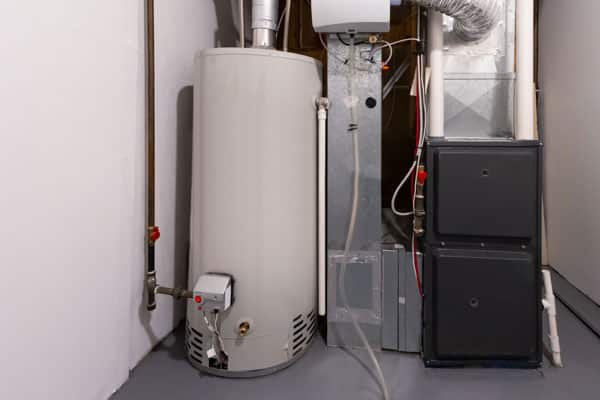Selecting the right size water heater is a big decision since it greatly impacts your family’s comfort and energy bills. If the water heater is too small, then there won’t be enough hot water available for your daily routines (like washing hands or taking showers). If it’s too big, then you’re wasting energy to heat water that won’t get used. In this blog post, we’ll dive into all the details about what to consider when picking the perfect-sized water heater for your Denver home. Let’s get started!
Tank Water Heater
To properly size a tank water heater (also known as a storage water heater), follow these simple steps:
Step 1: Calculate Your Household’s Peak Hour Demand
First, you need to determine the peak hour demand of your household. This refers to the highest amount of hot water you’ll need during a single one-hour period, taking into account the number of people living in your home. This number is not necessarily a realistic estimate of your daily hot water usage, but rather a theoretical maximum that your water heater should be capable of meeting.
To estimate your peak hour demand, you can use this handy formula:
(Number of people in your home) x (12 gallons) = Peak Hour Demand
For example, if you have three people living in your home, your peak hour demand would be 36 gallons (3 people x 12 gallons).
Step 2: Find the First Hour Rating
The first hour rating is the number of gallons of hot water the heater can supply per hour, starting with a full tank of hot water. You can find the first hour rating on the EnergyGuide label located in the top left corner of the water heater. If the water heater is a conventional storage water heater, the EnergyGuide label is required by the Federal Trade Commission. If it’s a heat pump water heater, you may need to check the product literature from the manufacturer.
Step 3: Find a Heater with a First Hour Rating That Matches Your Peak Hour Demand
Next, you need to find a water heater with a first hour rating that matches your peak hour demand. Now you’re all set to find the perfect-sized water heater for your home.
Tankless Water Heater
When selecting a tankless (also called “on-demand”) water heater, you should also consider the size of your household and your hot water usage patterns, just as you would for a tank water heater. However, the calculation is slightly different because tankless water heaters do not store hot water. Instead, they heat the water on demand as it flows through the unit.
Step 1: Determine the Flow Rate of Each Fixture in Your Home
To calculate the appropriate size of the tankless water heater, you need to determine the flow rate of hot water that you need at any given time. This will depend on the number of fixtures (showerheads, faucets, etc.) that will be using hot water simultaneously. You can use the flow rate of each fixture to calculate the total flow rate.
Step 2: Select a Water Heater Matching Your Flow Rate and Desired Temperature Rise
Once you have determined the total flow rate, you can select a tankless water heater that can provide that flow rate at the desired temperature rise (the difference between the temperature of the incoming water and the desired output temperature).
It’s important to note that you may need to install multiple tankless water heaters if you have a high demand for hot water, or if the fixtures in your home are located far from each other.
Solar Water Heating System
When selecting a solar water heating system, you should consider the size of your household, your hot water usage patterns, and the climate in your area. Solar water heating systems typically consist of a storage tank and one or more solar collectors that absorb sunlight and convert it into heat to warm the water.
Step 1: Determine Your Household’s Hot Water Needs
To size your solar water heating system, you first need to know how much hot water your household uses. This will help you determine the collector area and storage volume required to meet your hot water needs. Solar system contractors use worksheets and computer programs to help determine system requirements and collector sizing.
Step 2: Calculate Your Collector Area
The collector area is the surface area of the solar panels that collect energy from the sun. Solar contractors typically use a guideline of 20 square feet (2 square meters) of collector area for the first two family members. For each additional person, add 8 square feet (0.7 square meters) if you live in the U.S. Sun Belt area or 12-14 square feet if you live in the northern United States.
To determine the collector area you need, simply multiply the number of family members by the appropriate square footage and add it all up. This will give you the total collector area required for your system.
Step 3: Determine Your Storage Volume
The storage volume is the amount of hot water your system can store at any given time. A small (40- to 50-gallon) storage tank is usually sufficient for one to three people, while a medium (75-gallon) tank works well for three to four people. A large tank is appropriate for four to six people.
For active systems, the size of the solar storage tank increases with the size of the collector, typically 1.5 gallons per square foot of collector. This helps prevent the system from overheating when the demand for hot water is low. In very warm, sunny climates, some experts suggest that the ratio should be increased to as much as 2 gallons of storage to 1 square foot of collector area.
By following these easy steps, you can determine the total collector area and storage volume you’ll need to meet 90%-100% of your household’s hot water needs during the summer. Provide this information to your solar contractors to get the perfect-sized water heater!
Finding a Water Heater to Meet Your Family’s Needs
Picking the right size water heater is a critical decision that can impact your home’s comfort and energy bills. By taking into account the factors we discussed for each type of water heater, you’ll be able to select a system that fits your family’s needs and budget. Contact our team of expert technicians for advice on picking out a water heater and installing it in your Denver Metro home!
Contact Us [theme_company_telephone]


